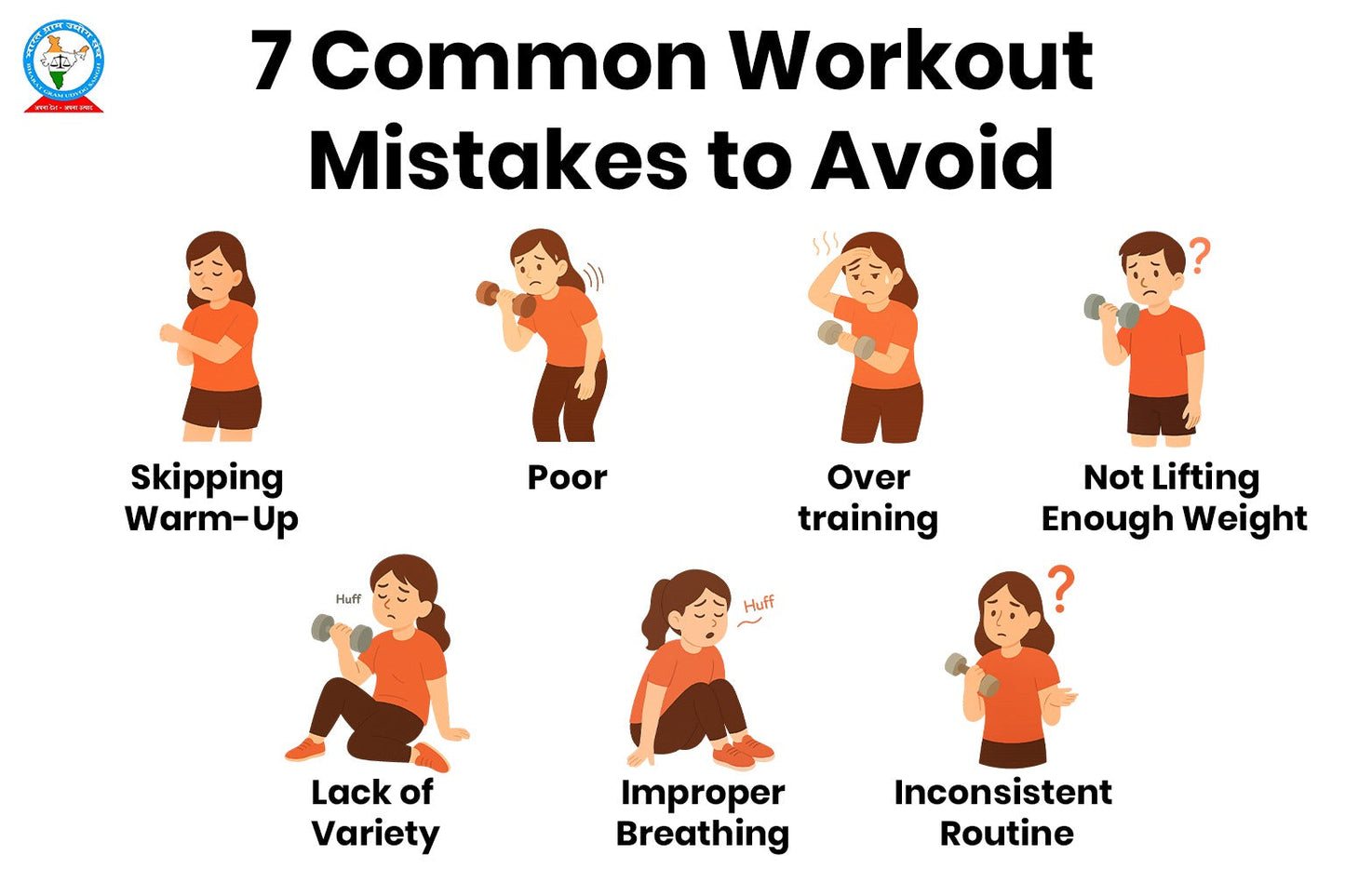
7 Common Workout Mistakes to Avoid
Physical activity plays a vital role in maintaining a healthy and balanced life. But mistakes on your fitness journey can hinder progress and increase your risk of injury. Whether you're a beginner or an avid fitness enthusiast, avoiding these common workout mistakes can make a huge difference in results and experience in all cases. In this blog, we’ll explore seven frequent workout mistakes and share practical tips to help you steer clear of them for better fitness results.
1. Skip Warm-Up and Cool-Down
A common mistake many people make is neglecting the warm-up and cool-down portions of their workouts.
Why it’s important: Warming up prepares your body for exercise by increasing blood flow to muscles and increasing flexibility. Relaxation helps your body slowly return to a resting state, reducing pain and stiffness.
How to avoid it: Do 5-10 minutes of dynamic stretches or light cardio before exercising. After your workout, do a static stretch to relax your muscles and promote recovery.
2. Using the wrong paper
Exercising poorly can lead to injury and decrease your workout.
Why it’s important: Proper alignment ensures you’re targeting the right muscles and avoids unnecessary stress on joints and muscles.
How to avoid it: Learn the proper technique for each exercise, whether through a certified instructor, online classes, or fitness classes. Start with lighter items to improve the form before moving on to heavier items.
3. Overtraining
Working out feels great, but doing too much can hurt your body instead of helping it.
Why it matters: Overtraining increases your risk of injury, fatigue and burnout, which can derail your fitness progress.
How to avoid it: Give your body enough time to recover between intense workouts. Aim for at least one rest day a week and listen to your body’s cues, like chronic pain or fatigue.
4. Lack of clear goals
Exercising without a specific goal can lead to inconsistent motivation and progress.
Why it matters: Clear goals provide direction and help you measure your progress, keeping you motivated.
How to avoid it: Set SMART goals—specific, measurable, attainable, relevant, and time-bound. For instance, rather than saying, "I want to be healthy," try setting a clear goal like, "I’ll exercise three times a week and drop 5 pounds in 8 weeks."
5. Ignoring nutrition
Exercise and nutrition go hand in hand, but many people focus solely on exercise and neglect their diet.
Why it matters: Without proper nutrition, your body will not have enough energy to function properly, and it will recover more slowly. Poor food choices can also negate the benefits of exercise.
How to avoid it: Feed your body with a balanced diet that includes protein, healthy fats, carbohydrates, and essential nutrients. Stay hydrated and consider eating a light meal before exercising to boost your energy levels.
6. Adherence to a practice
Repeating the same exercise increases the risk of boredom, plateauing, and overuse injuries.
Why it matters: Your body adapts to repetitive exercise, which becomes less effective over time. Diversity makes your workouts more challenging and interesting.
How to avoid it: Mix up your workout routine every 4-6 weeks. Incorporate different exercises to target different muscle groups and keep things interesting, like strength training, cardio, yoga, and HIIT.
7. Focus on just one aspect of fitness
Some people focus solely on strength or cardio training, neglecting other fitness essentials.
Why it’s important: A circular exercise program improves overall health, including strength, flexibility, endurance, and balance.
How to avoid it: Develop a balanced exercise program that includes cardio, strength training, flexibility exercises and work out. For example, supplement your routine by adding weight lifting to yoga or Pilates.
Another tip to boost your workout
Be consistent: Results take time, so stick to your routine and be patient with your progress.
Track your progress: Track your workouts with a fitness journal or app to help you stay on track and make necessary changes.
Rest and sleep: Adequate sleep is essential for overall muscle strength and well-being. Aim for 7-9 hours of sleep per night.
Seek professional guidance: If you are unsure of your workout, contact a personal trainer to customize a program to your goals.
conclusion:
Avoiding these common workout mistakes can improve your workout routine, maximize results, and reduce your risk of injury. From warming up properly to maintaining a balanced routine, these small changes can have a big impact on your fitness journey. Remember that consistency, the right approach, and overall strategy are the keys to your long-term success. By being mindful of this potential pitfall, you can make your workouts incredibly safe, fun, and rewarding. Get started today, and take your fitness journey to the next level!
